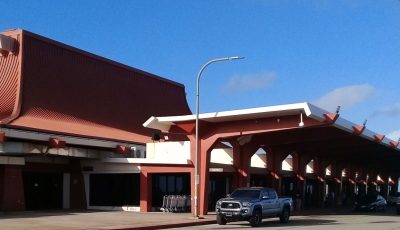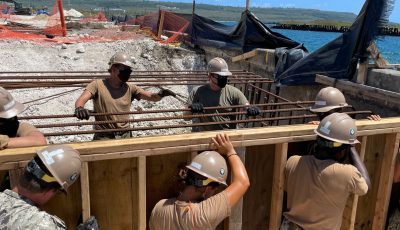Bid to dismiss CPA suit over defective runway denied
The Superior Court has denied a contractor’s bid to have a Commonwealth Ports Authority lawsuit against it dismissed, relating to their dispute in a runway project at the Francisco C. Ada/Saipan International Airport.
In the same order on Tuesday, Presiding Judge Roberto C. Naraja also denied GPPC Inc.’s motion to dismiss CPA’s third-party complaint against Fidelity and Deposit Co. of Maryland, an insurance company that provided a performance bond for GPPC.
GPPC had sued CPA for allegedly causing the company to incur $39 million in damages over the airport runway project. In response, CPA sued GPPC and Fidelity. GPPC then moved to dismiss CPA’s counterclaims.
CPA counsel Robert T. Torres told Saipan Tribune yesterday that CPA looks forward to proceeding with its case against GPPC for the defective runway and the bonding company’s refusal to cover the bond.
“[CPA] is very disappointed with the workmanship and will look to ensure the continuing safety of our airlines and public at all times,” Torres said.
GPPC counsel Mark B. Hanson said that Naraja ruled that CPA’s counter-allegations against GPPC, while possibly insufficient for CPA to prevail at trial, are sufficient to survive a motion to dismiss at this stage of the litigation.
“While GPPC disagrees, the case will obviously proceed with CPA advancing its baseless counterclaims against GPPC, at least for the moment,” Hanson said.
Hanson said they are confident that GPPC will prevail.
The lawyer said they also believe that GPPC’s surety, Fidelity, is not a party to this action.
“GPPC is fully capable of supporting any obligations it may have to any project owner, including CPA,” he said.
Hanson said GPPC believes it is “inappropriate to try to leverage unwarranted compliance with overreaching CPA demands” through litigation.
In denying GPPC’s motions, Naraja ruled that CPA’s negligent construction claim does not fail as a matter of law because CPA alleged damage to “other property.”
Naraja said CPA’s Consumer Protection Act claim does not fail because an analysis of the statutory text and relevant case law indicates as much.
Naraja said CPA’s fraud claim survives because CPA sufficiently pled its claim.
In CPA’s counterclaims against Fidelity, Naraja ruled that CPA’s suit against Fidelity is appropriate because the claims are inextricably tied to the dispute between CPA and GPPC.
Last April 4, CPA filed its answer to GPPC’s complaint as well as counterclaims against GPPC and a third-party complaint against Fidelity.
In its counterclaim, CPA claims that GPPC is liable for breach of contract, breach of implied duty of good faith and fair dealing, negligent construction, violation of the Consumer Protection Act, and fraud.
In its third-party complaint against Fidelity, CPA claims that Fidelity breached its obligations to pay out under the performance bond after GPPC allegedly failed to perform under the construction contract.
Last May 19, GPPC filed the motion to dismiss CPA’s counterclaims and a motion for misjoinder.
GPPC argued that CPA’s third, fourth, and fifth causes of action in its counterclaim fail as a matter of law and that CPA’s joinder of Fidelity is legally improper.
CPA countered that its counterclaims against GPPC alleges that GPPC’s defective work has resulted in harm beyond the defective runway by: causing damage to the underlying runway; opening CPA to possible liability resulting from noncompliance with Federal Aviation Administration safety standards, which could result in closure of the runway; and causing CPA to have to shoulder $20 million in repair costs.
On CPA’s negligent construction claim, CPA has alleged damage to other property, Naraja said, making dismissal inappropriate.
With respect to CPA’s Consumer Protection Act claim, Naraja said that GPPC did raise a number of novel arguments against allowing CPA’s Consumer Protection Act claim to proceed but its arguments fail.
All the claims go to the issue of whether GPPC and Fidelity breached their contractual obligations to CPA as it relates to the runway project, Naraja said.
Naraja said CPA alleges that GPPC breached its obligations by producing a defective runway and also alleges that Fidelity has breached its obligations by failing to pay out the performance bond to CPA.
Naraja said all the claims go to the same set of transactions and both GPPC and Fidelity may be liable.
CPA embarked on a runway rehabilitation program dating back to 2002-2003 as part of an effort to fix the aging runway at the Francisco C. Ada/ Saipan International Airport.
The rehabilitation program culminated with the award of a contract to GPPC in 2009.
The original consideration for the contract prior to the change of orders and supplemental agreements was $12,488,800.



























